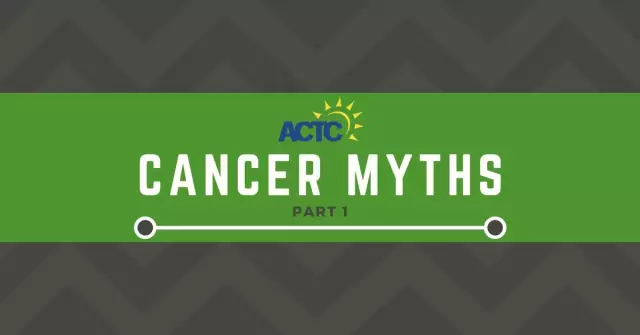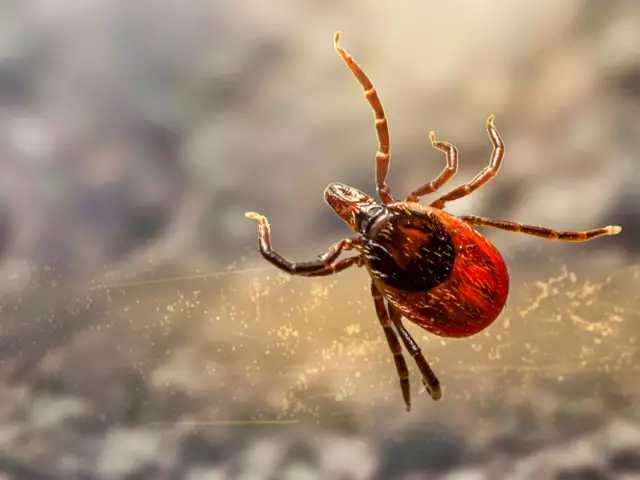- Author Rachel Wainwright wainwright@abchealthonline.com.
- Public 2023-12-15 07:39.
- Last modified 2025-11-02 20:14.
Cancer: myths and reality

Cancer is one of the most frightening diseases. It is known that many people perceive the sounded diagnosis of "cancer" as an unambiguous sentence to death, and a long and painful death. It is so difficult that among people who have been diagnosed with this cancer, the suicide rate is four times higher than the average. Fear and panic often accompany the unknown, but meanwhile, scientific and practical oncology has stepped far ahead even in comparison with ten years ago, and has little in common with the horror stories that are walking among the people. The most common cancer myths and their debunking are offered below.
Myth 1. Cancer is incurable
This is not true for a long time. The current level of medicine makes it possible to successfully treat many types of cancer, and tumors that were caught at an early stage are curable almost all. The main cause of cancer death is late diagnosis, when a tumor has grown into neighboring tissues, and its daughter tumors, metastases, have spread throughout the body. But even in this stage of cancer, called terminal, the mortality rate is not one hundred percent. There are people who have been able to defeat such a serious disease as metastatic cancer.
Myth 2. Cancer is inherited
Many have heard about the burdened heredity in connection with cancer, and doctors, during routine examinations, usually ask questions about relatives suffering from cancer, and therefore people believe that if someone close to them falls ill with cancer, they are also sentenced. This is not true. Yes, oncologists consider the genetic factor to be one of the important factors in the susceptibility of cells to mutations, including malignant ones, but the disease is not inherited, but only a predisposition to it can be transmitted. If any of your relatives, especially first-line relatives, that is, blood relatives - mother, father, brother, sister - have suffered cancer, then you really have a higher risk of getting sick than those whose relatives did not suffer from tumors. Doctors regard this risk as high; on average, it is 7%. But this fact also means something else:such people need to monitor their health more carefully than others, including undergoing preventive examinations. Those who take care of their bodies have a tenfold lower risk of getting cancer than those who don't. Compare the 7% hereditary risk versus, say, the 85% risk of getting respiratory cancer from smoking.
Myth 3. If you quit smoking, the risk of lung cancer is eliminated
It would be nice if this were the case. In fact, everything depends not so much on the experience of the smoker as on the individual characteristics of his body. It is believed that, on average, the lungs are cleared of the effects of smoking in five years - so much is needed to replace cells exposed to tobacco carcinogens. However, even after this control time, the increased risk remains, although it is significantly, several times less than with continued smoking. There is also evidence that the later a person acquired this bad habit, the more, oddly enough, it is more dangerous in relation to the development of cancer.
Myth 4. Official medicine cannot cope with cancer, but traditional medicine can help
One of the most dangerous myths, on account of which there are more than one thousand ruined lives. Passion for alternative medicine in the early stages of cancer leads to self-deception and tumor progression, and in the later stages it is generally guaranteed to be fatal. Everyone knows that doctors cannot stand the abundance of "hereditary healers" who offer traditional methods of cancer treatment, but few people realize that they have good reasons for this. Anyone who has ever seen a person dying of cancer, who missed all chances for a cure due to excessive trust in pseudo-healers, will no longer be able to relate to this phenomenon differently. The statistics collected by oncologists and confirmed by the participants of large oncological Internet forums clearly indicate:in the later stages of cancer, cure by alternative methods has never happened. All those infrequent cases of healing in the terminal stages of cancer, which we mentioned in the chapter "Myth 1. Cancer is incurable", accounted for exclusively by patients treated in specialized cancer centers. Many talk about cases of miraculous cures, the most incredible recipes are offered, from tincture of black walnut to acid-alkaline baths, but none of these widely advertised "facts" have been confirmed. It is always either fiction or word of mouth, when he himself did not see, but knowledgeable people spoke. Many talk about cases of miraculous cures, the most incredible recipes are offered, from tincture of black walnut to acid-alkaline baths, but none of these widely advertised "facts" have been confirmed. It is always either fiction or word of mouth, when he himself did not see, but knowledgeable people spoke. Many talk about cases of miraculous cures, the most incredible recipes are offered, from tincture of black walnut to acid-alkaline baths, but none of these widely advertised "facts" have been confirmed. It is always either fiction or word of mouth, when he himself did not see, but knowledgeable people spoke.
Myth 5. Cancer can be infected because it is caused by viruses
First, the influence of viruses on the formation of only some types of cancer has been reliably established; in other cases, this factor of influence is either hypothetical or has not been confirmed. Secondly, even when the viral origin of cancer is considered proven, as in the case of cervical cancer or some types of lymphoma, it cannot be easily infected. Carriage of viruses in the worst case creates a predisposition to cancer, but not the disease itself. In the overwhelming majority of cases, the viruses that cause cancer are not transmitted from person to person at all, referring to the so-called endoviruses - not penetrating from the outside, but forming directly in the human body under certain conditions.
Myth 6: Chemotherapy and radiation do more harm than good

“Chemo and radiotherapy weakens a person, and his hair falls out, but this does not affect the tumor. Doctors prescribe this out of impotence, and only an operation can help, and that's all. For some reason, this myth is widespread. In fact, cancer cells are not more stable than healthy ones, but on the contrary, they are defective and therefore more vulnerable. Cancer treatments such as radio and chemotherapy are based on this. Doses of radiation or poisons that kill tumor cells are not able to kill healthy people, although they can still harm them, which is why chemotherapy and radiation are accompanied by hair loss, nausea, and poor health. But healthy cells will not die, but will recover, in contrast to degenerative tumor cells. You cannot unreasonably refuse chemotherapy and radiation therapy if they were prescribed by a doctor, even if the operation was successful. Malignant cells may remain in the body, which are not detected for the time being, but if they are not killed, then sooner or later they will give birth to a new tumor, or maybe not one.
Summing up, we can say with confidence that cancer is neither the most terrible, nor the most incurable disease. And although, of course, he is not a joy either, you cannot give up with this diagnosis, but you need, on the contrary, to mobilize all mental strength in yourself, tune in to the struggle and to a positive result, take responsibility for the recommendations of doctors and with sound criticism the advice of charlatans. And then it is quite possible that the statistical indicators of mortality from cancer will become a few more units lower.
Another common misconception about cancer is encountered by Israeli oncologists who receive tourists from post-Soviet countries: almost all patients are convinced that the prevalence of the oncological process, the presence or absence of metastases, is what determines the prognosis of the disease. The most striking example, refuting this statement, is breast cancer. The prognosis of treatment and the outcome of the disease is determined by the sensitivity of the tissue to the three main hormones - estrogen, progesterone and herceptin. With triple hormonal sensitivity, the prognosis for complete recovery is optimistic, sometimes even without the use of chemotherapy, and with triple-negative type of cancer, i.e. insensitive to any of the hormones, the patient is forced to receive the most aggressive chemotherapy drugs to prolong her life. Each type of cancer has its own histological nuances that determine the outcome of the disease, which can be summarized as aggressiveness of the cancer. Thus, the presence of metastatic lesions is not always a bad prognostic sign, according to Israeli oncologists.
Found a mistake in the text? Select it and press Ctrl + Enter.






